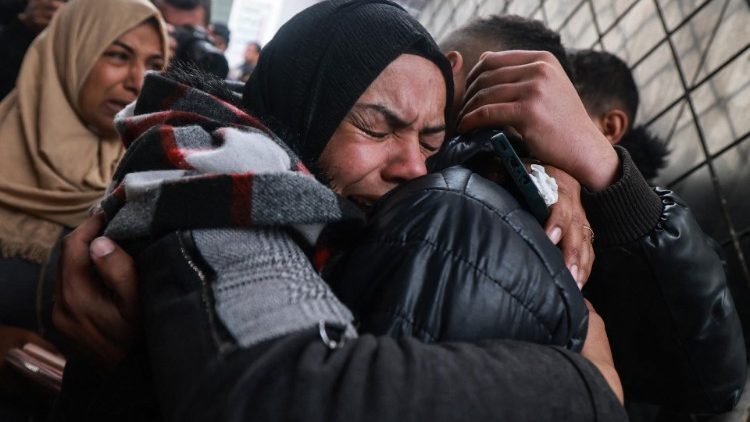Reacting to the vote on Wednesday evening, CAFOD, which has been pushing for a permanent and urgent ceasefire together with its partners and other humanitarian agencies, expressed satisfaction with the motion calling for an immediate humanitarian ceasefire in Gaza.
It comes as the death toll in the enclave nears 30,000 and fears of an imminent ground offensive by Israeli Forces on Rafah increase.
CAFOD is the official aid agency of the Catholic Church in England and Wales, and part of Caritas International. It has been striving, thanks to its partners on the ground in Gaza, to provide humanitarian relief to the struggling population as well as lobbying leaders to agree to a diplomatic solution to the crisis triggered by the Hamas attacks on October 7, 2023.
In a statement released by Elizabeth Funnell, CAFOD’s representative for the Middle East said “At a time when tens of thousands of children have already been killed, we need our political leaders to step up and show real leadership and support a lasting peace.”
Speaking to Vatican Radio, on the day following the vote, Funnell explained why a ceasefire is necessary and urgent from a series of perspectives:
“We welcome this [motion] as a first step and what we hope for and what we’ll continue asking for is that the UK government uses all the leverage that it can to ensure that a full and permanent ceasefire is reached and that the hostages be released and that more aid can get in very quickly,” Funnel stated, expressing relief that it seems “political leaders are beginning to talk in clearer terms about the need for a ceasefire.”
Not only is a ceasefire crucial to be able to get aid to a population that is wounded and without medicine, hungry and without food, cold and without shelter, she reiterated “it is the only way to free hostages” and to prevent more civilian deaths.
When the last two Israeli hostages were freed during an Israeli Special Forces raid on 12 January, many perhaps remain unaware that some 70 Palestinians were killed during that operation.
Misery in one of the most densely populated places on earth
“In the south of Gaza where that raid took place, there are now more than 1.3 million people sheltering in a very small area. It’s probably one of the most densely populated places on earth,” Funnell explained.
Many of these people, she continued, have been displaced many times because their homes were destroyed or because they were advised to evacuate. Now they are living in makeshift shelters or tents.
“And because of how densely populated that area is, any ground invasion of that area by military forces or continued airstrikes will be absolutely catastrophic,“ she said, decrying the fact that out of the almost 30,000 people who have been killed since the beginning of the war, most of them are women and children.
“That’s why we really urgently need that ceasefire: to prevent further loss of life,“ Funnell reiterated.
Huge challenges for humanitarian workers
The CAFOD Middle East representative also shed light on the challenges faced by humanitarian agencies attempting to deliver aid amid the dangerous and unstable environment.
Not only are people afraid to go out in search of basics like milk, food and dry clothing for their children because of the bombardments and the intensity of the fighting, but “the prices are just too high for them to be able to afford them,” Funnell explained.
Added to this, the destruction of infrastructure and the escalating danger for aid workers have made it imperative to change the current scenario to prevent a further escalation of the humanitarian crisis.
The desperation of children
In constant contact with CAFOD partners on the ground in Gaza, many of whom have paid the highest price as they carried out their work to provide aid to people in need, Funnell highlighted how children are suffering enormously as they are killed, injured, orphaned and witness constant violence and destruction.
She told the heartbreaking story of a little girl, the daughter of one of CAFOD’s partners in Gaza who, in the face of constant danger has expressed her wish to wear her fancy-dress costume every day “because she says if she’s going to die, if she’s going to lose her life, then she at least wants to be wearing her favourite outfit.”
Amidst these challenges, CAFOD remains steadfast in its mission, collaborating with various partners on the ground, including church-based organizations and secular entities who, Funnell said, continue to demonstrate remarkable resilience and courage, providing aid and support to the affected population in the face of overwhelming adversity.
Pope Francis’ calls for peace
As international efforts continue, Funnell highlighted the importance of Pope Francis’ untiring calls for peace and reiterations that war is always a defeat for all.
“We really welcome those words from him and we’re encouraging other leaders to follow suit and to do everything that they can to call for a ceasefire and to end the violence.
And also really crucially to push for long-term solutions that will bring peace and justice to all the peoples who live in the region,” she said.
The power of prayer and unity
She expressed confidence in the power of unity and collaboration: ”I was with a group of Christians outside Parliament in a prayer vigil just this Monday in London and I think just unity and working together and pushing for a just solution and for that immediacy so it can go hand in hand. and working together, and pushing for a just solution”
Elizabeth Funnell concluded by encouraging people to pray for those who are suffering.
“I just want to encourage people if they can to pray. I know that Christians across the Holy Land are so encouraged by that solidarity and those prayers of people overseas,” she said, adding also that if people can respond financially to CAFOD’s appeal, they can do so on the organization’s website.
By Linda Bordoni | vaticannews






